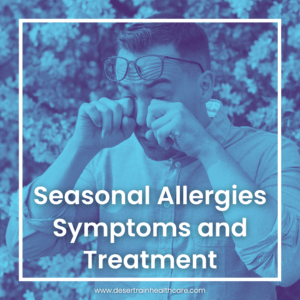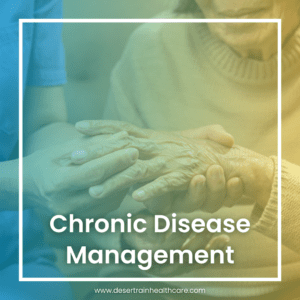Caring for Our Loved Ones with COVID-19
The COVID-19 pandemic has presented unprecedented challenges for families around the world. Caring for a loved one with COVID-19 can be an overwhelming and emotional experience, especially when trying to navigate the complexities of the virus, prevent its spread, and ensure that the patient receives the care they need. It’s crucial to have the right information, resources, and support to provide the best possible care for your loved one while also protecting yourself and others.
At Desert Rain Healthcare in Glendale, Arizona, Nurse Practitioner Leslie Saeugling and her team are committed to providing comprehensive care and support for families dealing with COVID-19. Whether you need in-person visits or virtual telehealth appointments, Desert Rain Healthcare offers personalized care tailored to your needs, ensuring that you and your loved ones receive the guidance and treatment necessary during these challenging times.
Understanding COVID-19 Symptoms and Progression
COVID-19 symptoms can vary widely from person to person, ranging from mild to severe. It’s essential to recognize the symptoms and monitor the progression of the illness to provide appropriate care. Common symptoms of COVID-19 include:
- Fever or chills
- Cough
- Shortness of breath or difficulty breathing
- Fatigue
- Muscle or body aches
- Headache
- New loss of taste or smell
- Sore throat
- Congestion or runny nose
- Nausea or vomiting
- Diarrhea
In some cases, COVID-19 can lead to severe complications, such as pneumonia, acute respiratory distress syndrome (ARDS), and multi-organ failure. It’s crucial to be vigilant for warning signs that may indicate a need for emergency medical care, such as:
- Difficulty breathing or shortness of breath
- Persistent chest pain or pressure
- Confusion or inability to stay awake
- Bluish lips or face
If you notice any of these severe symptoms, seek emergency medical attention immediately.
Caring for a Loved One with COVID-19 at Home
Most people with COVID-19 experience mild to moderate symptoms and can recover at home. However, caring for someone with COVID-19 requires careful attention to both their health and the safety of everyone in the household. Here are some important steps to follow:
1. Isolate the Patient
Isolation is critical to prevent the spread of the virus within your household. The person with COVID-19 should stay in a separate room, away from other family members, and use a separate bathroom if possible. Limit their contact with other household members and pets. If isolation within the home is challenging, consider using physical barriers, such as curtains, to separate the patient’s space from common areas.
2. Monitor Symptoms Closely
Regularly check the patient’s symptoms, including their temperature, breathing, and overall condition. Keep a log of their symptoms, noting any changes or worsening conditions. This information can be helpful if you need to consult with a healthcare provider or seek medical attention.
3. Encourage Rest and Hydration
Rest is essential for recovery. Encourage your loved one to get plenty of sleep and avoid strenuous activities. Staying hydrated is equally important, so ensure they drink plenty of fluids throughout the day. Clear fluids like water, herbal teas, and broths can help keep them hydrated.
4. Provide Over-the-Counter Medications
Over-the-counter medications can help alleviate some of the symptoms of COVID-19. For example, acetaminophen (Tylenol) can help reduce fever and relieve aches and pains. Be sure to follow the dosing instructions on the label and consult with a healthcare provider before giving any medications, especially if the patient has underlying health conditions or is taking other medications.
5. Support Nutritional Needs
A balanced diet is important for supporting the immune system during recovery. While some people with COVID-19 may have a reduced appetite, encourage them to eat small, nutritious meals. Foods rich in vitamins, minerals, and antioxidants, such as fruits, vegetables, lean proteins, and whole grains, can help support the body’s ability to fight off the virus.
6. Practice Good Hygiene and Cleanliness
To prevent the spread of the virus within the home, practice good hygiene and cleanliness:
- Wear a mask when caring for the patient and ensure they wear one as well, especially if they need to be around others.
- Wash your hands frequently with soap and water for at least 20 seconds, especially after caring for the patient or touching surfaces they’ve come into contact with.
- Clean and disinfect high-touch surfaces daily, including doorknobs, light switches, countertops, and bathroom fixtures.
- Avoid sharing personal items like dishes, towels, and bedding with the patient.
7. Stay Connected with a Healthcare Provider
Regular communication with a healthcare provider is crucial for monitoring the patient’s condition and receiving guidance on care. Desert Rain Healthcare offers virtual telehealth appointments, allowing you to consult with Nurse Practitioner Leslie Saeugling from the comfort of your home. Whether you need advice on managing symptoms or concerns about the progression of the illness, having a trusted healthcare provider to turn to can provide peace of mind.
When to Seek Medical Attention
While most people with COVID-19 recover at home, it’s important to know when to seek medical attention. If your loved one’s symptoms worsen or they develop severe symptoms, such as difficulty breathing, persistent chest pain, confusion, or bluish lips or face, seek emergency care immediately. Do not wait to see if symptoms improve on their own, as timely medical intervention can be critical.
Protecting Yourself and Others
Caring for a loved one with COVID-19 requires taking precautions to protect yourself and other members of the household from contracting the virus. Here are some additional steps to consider:
- Limit Visitors: Avoid having visitors in your home while caring for someone with COVID-19. If someone must visit, ensure they follow all safety protocols, including wearing a mask and maintaining physical distance.
- Quarantine After Exposure: If you’ve been in close contact with the patient, consider quarantining yourself for 14 days and monitor for symptoms of COVID-19.
- Get Tested: If you develop symptoms or believe you’ve been exposed, get tested for COVID-19. Testing is available at various locations, and Desert Rain Healthcare can provide guidance on where to go.
Desert Rain Healthcare: Supporting You During COVID-19
At Desert Rain Healthcare, we understand the challenges of caring for a loved one with COVID-19 and are here to support you every step of the way. Nurse Practitioner Leslie Saeugling and her team offer compassionate, personalized care to help you navigate these difficult times. Whether you need guidance on managing symptoms, accessing treatment, or understanding when to seek further medical care, we’re here to help.
Desert Rain Healthcare offers both in-person visits at our Glendale office and convenient virtual telehealth appointments, allowing you to receive care from the comfort of your home. We are currently accepting new patients and are here to provide the support and care you need during this challenging time.
Our office is located at 5721 W. Bell Rd, Suite 21, Glendale, AZ 85308. To schedule an appointment, please call our clinic at (623) 432-4263.
Conclusion
Caring for a loved one with COVID-19 can be a challenging and emotional experience, but with the right knowledge and support, you can provide effective care while keeping yourself and others safe. By following the guidelines outlined above and staying connected with a healthcare provider, you can help your loved one recover while minimizing the risk of spreading the virus.
If you need assistance or have concerns about caring for someone with COVID-19, don’t hesitate to reach out to Desert Rain Healthcare. Our team is dedicated to providing the care and support you need during these difficult times.








